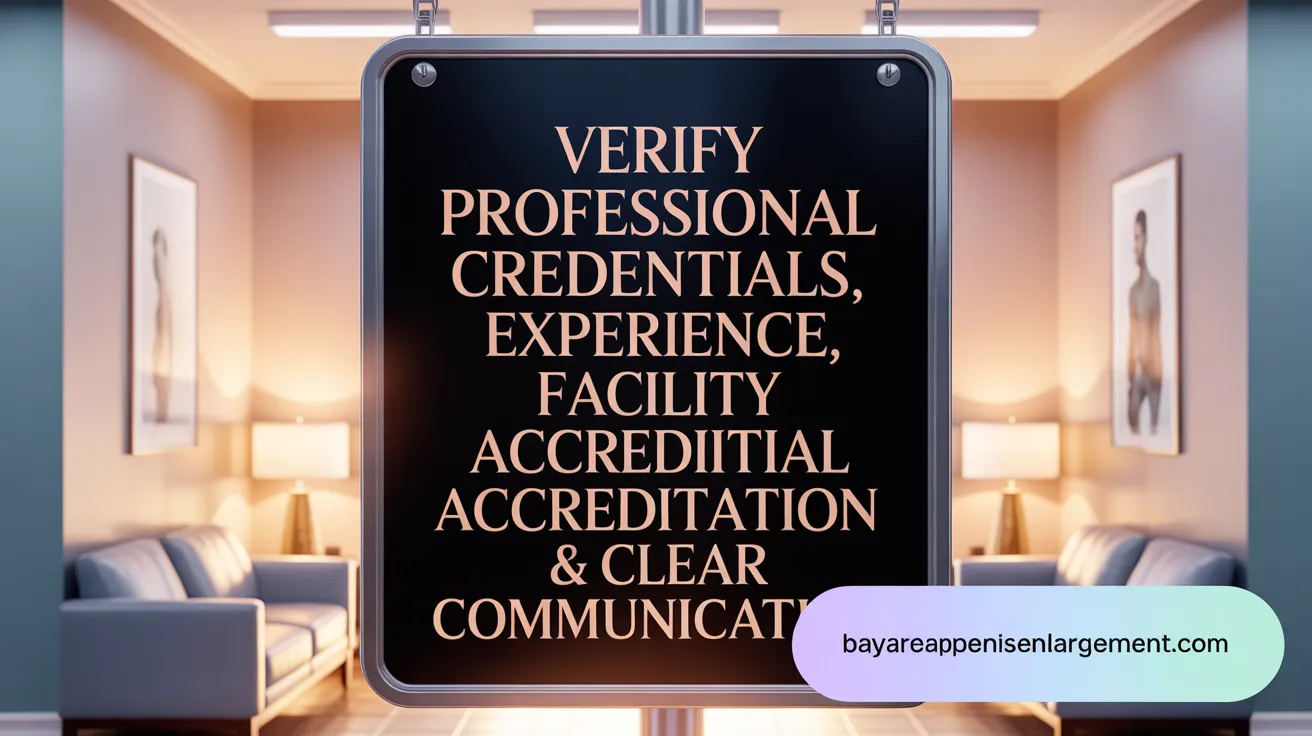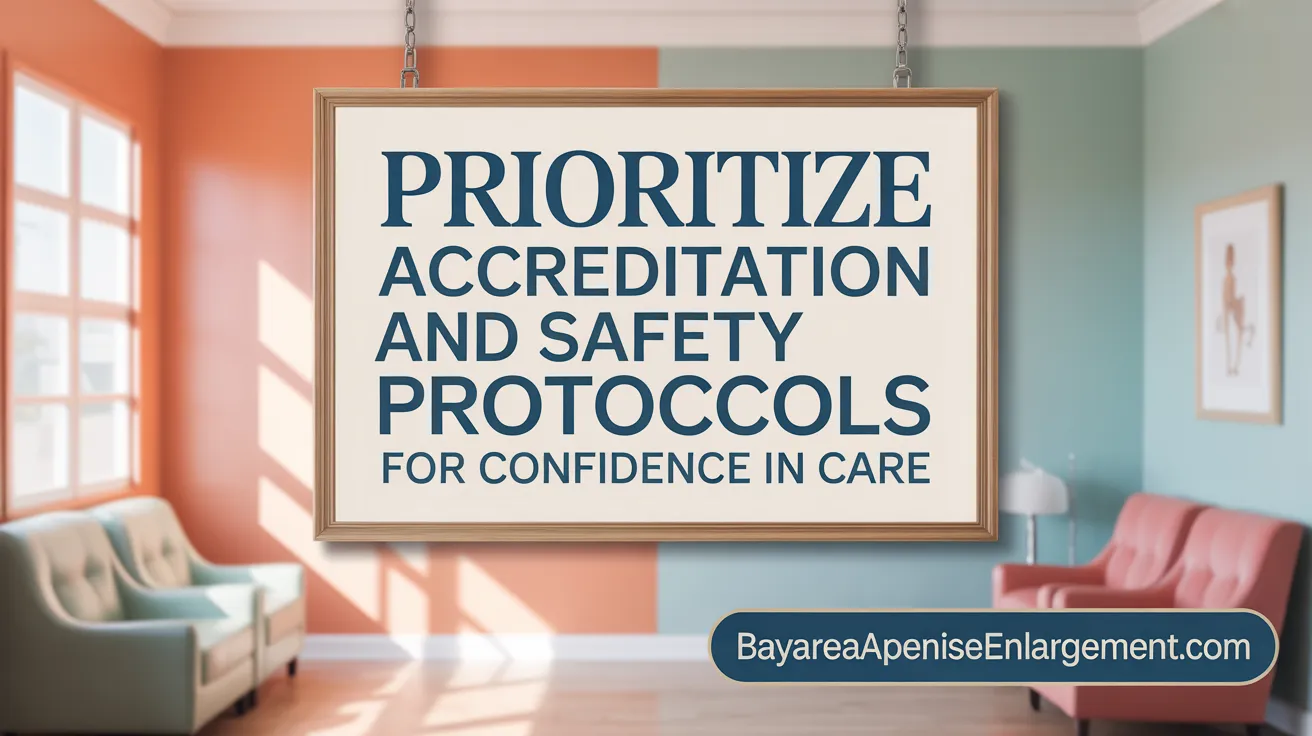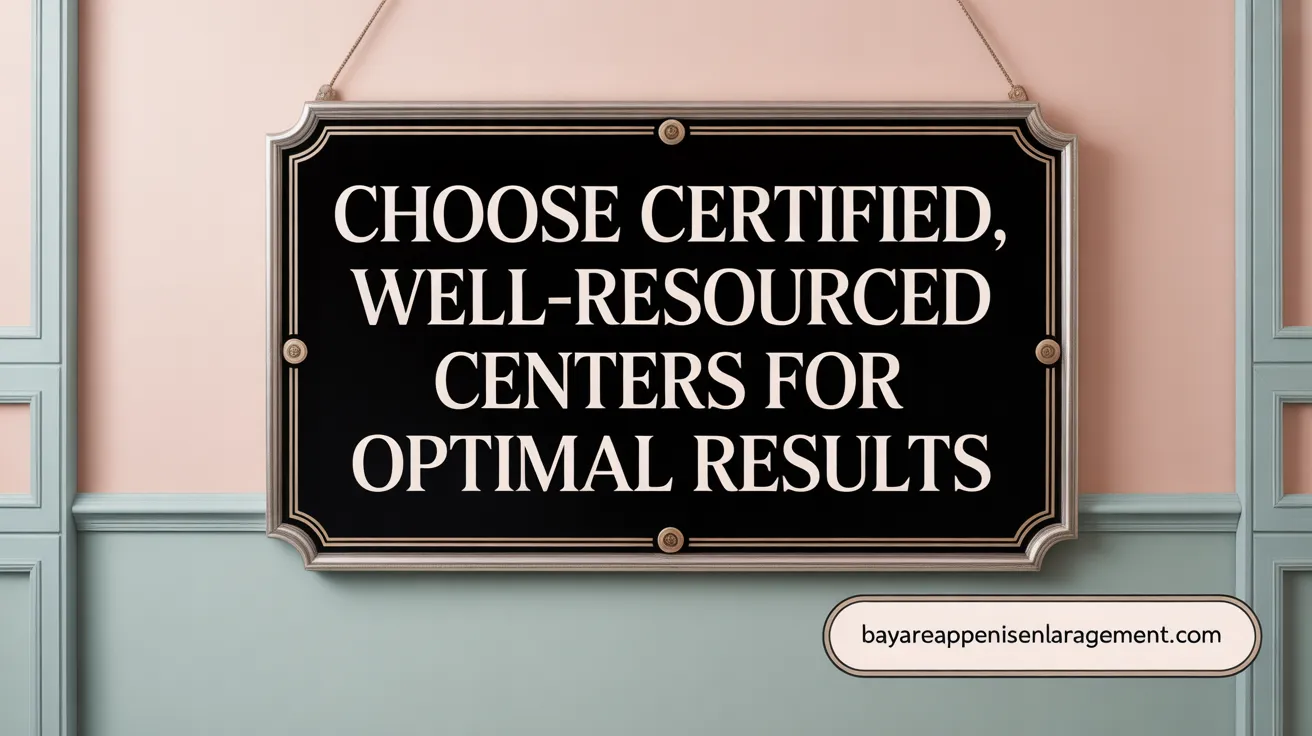Understanding the Importance of Choosing the Right Clinic
Selecting the right clinic for enhancement procedures is a critical step that can significantly impact your safety, satisfaction, and overall experience. With an abundance of options and varying standards in the aesthetic medical field, making an informed decision requires careful evaluation of several factors. This article offers comprehensive guidance on how to identify qualified plastic surgeons and reputable clinics, understand critical safety and quality benchmarks, and ask the right questions to ensure your aesthetic goals are achieved responsibly and successfully.
Key Criteria for Selecting Qualified Surgeons and Reputable Clinics

What criteria should be used to select qualified plastic surgeons and reputable clinics?
Choosing the right plastic surgeon and clinic is vital for safety, satisfactory results, and a positive experience. First, verify that the surgeon is board-certified by the American Board of Plastic Surgery (ABPS). This certification indicates the surgeon has undergone rigorous training, passed comprehensive exams, and maintains ongoing education.
Experience in the specific procedure is equally important. Ask about the surgeon’s track record, including their years of practice and specialization area—be it facial, body, or breast surgeries. Reviewing a gallery of before-and-after photos can provide insight into their aesthetic style and success rate.
Facility accreditation ensures safety and high standards of care. Reputable clinics are often certified by recognized organizations such as JCAHO, AAAASF, or state licensing bodies. Confirm that anesthesia is administered by qualified, board-certified anesthesiologists.
Patient testimonials and reviews are valuable resources. They reflect real experiences and satisfaction levels, helping you gauge the surgeon’s communication style and professionalism.
The importance of transparent, honest communication cannot be overstated. A good surgeon discusses potential risks, realistic outcomes, and sets appropriate expectations. Feeling comfortable and trusting your surgeon is essential for a smooth process.
Additionally, consider other factors like the clinic’s safety protocols, the surgeon’s professional affiliations, and their willingness to provide thorough consultations. Recommendations from other patients, referrals, and peer recognition can further support your decision. Ensuring these criteria will help you choose a qualified, reputable professional who prioritizes your safety and aesthetic goals.
Evaluating Clinic Safety, Quality, and Accreditation Standards

What factors are important to consider for safety, quality, and accreditation of clinics offering aesthetic procedures?
When choosing a clinic for cosmetic procedures, it is vital to assess its safety standards and accreditation. A reputable clinic should be accredited by recognized organizations such as the Joint Commission International (JCAHO), the American Association for Accreditation of Ambulatory Surgery Facilities (AAASF), or should be properly licensed according to local health authorities. These accreditations ensure the facility adheres to strict safety and hygiene protocols.
Maintaining a sterile environment is non-negotiable. The clinic should follow rigorous infection control practices, including sterilization of instruments and proper disposal of medical waste, to prevent complications.
The use of approved, high-quality medical products and state-of-the-art technology also indicates a commitment to safety and effective outcomes. Surgeons should utilize products and devices that have passed regulatory approval processes, like FDA clearance.
Post-operative care and follow-up procedures are essential components of a safe aesthetic experience. The clinic should provide detailed recovery instructions, schedule follow-up appointments, and have mechanisms in place to monitor patient healing and address any complications promptly.
Furthermore, ethical practices are fundamental. This includes honest communication, setting realistic expectations, and providing thorough consultations. Surgeons should evaluate each patient’s health history and determine their suitability for procedures, avoiding unnecessary or risky interventions.
Transparency in all procedures, costs, risks, and realistic outcome discussion enhances trust and helps patients make informed decisions. A clinic that prioritizes patient well-being by fostering a culture of safety, ethics, and continuous education demonstrates its commitment to high standards.
In summary, when reviewing clinics, consider their accreditation status, safety protocols, use of approved equipment, postoperative support, and ethical practices. These factors collectively ensure a safe, professional, and trustworthy environment for aesthetic treatments.
How to Assess Credentials, Expertise, and Reputation Effectively

How can patients assess the credentials, expertise, and reputation of clinics and plastic surgeons?
When considering cosmetic or reconstructive procedures, thorough research of the surgeon’s and clinic’s credentials is crucial. First, verify that the surgeon is licensed to practice in your state through your state’s medical licensing board. Most importantly, ensure they are board-certified by the American Board of Plastic Surgery (ABPS), which signifies they have completed extensive training and ongoing education recognized by the American Board of Medical Specialties.
Membership in reputable professional organizations, such as the American Society of Plastic Surgeons (ASPS), further indicates commitment to high standards, ongoing education, and patient safety. These memberships require adherence to strict ethical guidelines and continual professional development.
Checking the facility’s accreditation is another vital step. Ensure the clinic is recognized by organizations like the Joint Commission (JCAHO) or the American Association for Accreditation of Ambulatory Surgery Facilities (AAASF). Accreditation ensures that the facility meets strict safety and quality standards. Additionally, confirm that your surgeon has hospital privileges, which are granted only after thorough vetting of their credentials and competence.
Patient testimonials and outcome galleries provide insight into the surgeon’s style and results. Review before-and-after photos to assess their artistry and approach. Reading reviews from previous patients can also reveal their satisfaction level, communication style, and professionalism.
An in-person consultation allows you to meet the surgeon, discuss your goals, ask about their experience with your specific procedure, and evaluate your comfort level in communicating with them. It’s also essential to verify that anesthesia and surgical procedures are performed in accredited settings by qualified professionals, which further guarantees safety.
Overall, combining credential verification, facility accreditation, and personal impressions creates a comprehensive picture of a surgeon’s credibility and suitability for your needs. Taking these steps helps ensure your safety and maximizes the likelihood of satisfactory results.
Researching the surgeon’s experience and reputation is fundamental. Asking for referrals, reviewing patient testimonials, and viewing their professional portfolios can also guide your decision-making process.
Essential Qualities of a Reputable Medical Center for Aesthetic Procedures
 When seeking aesthetic treatments, choosing a reputable medical center is crucial for safety and optimal results. One of the first indicators is whether the center is staffed by licensed and board-certified professionals. For example, board-certified plastic surgeons by the American Board of Plastic Surgery ensure that the medical team has undergone rigorous training and ongoing education. Such certifications meet high industry standards and are recognized nationally.
When seeking aesthetic treatments, choosing a reputable medical center is crucial for safety and optimal results. One of the first indicators is whether the center is staffed by licensed and board-certified professionals. For example, board-certified plastic surgeons by the American Board of Plastic Surgery ensure that the medical team has undergone rigorous training and ongoing education. Such certifications meet high industry standards and are recognized nationally.
A reputable facility must also uphold comprehensive safety and hygiene protocols. This includes strict sterilization procedures, proper sanitation of equipment, emergency preparedness, and adherence to safety standards required by organizations like JCAHO or AAASF. These protocols help minimize risks such as infections and complications.
The use of advanced technology plays a vital role in achieving precise, safe, and effective treatments. Centers with modern equipment tailored to individual skin or body needs are ideal. A detailed initial assessment, including skin analysis and health evaluation, helps personalize each treatment plan, ensuring it aligns with the patient’s goals.
Transparency in communication and pricing fosters trust between patients and providers. Effective consultation involves clearly explaining the procedures, associated risks, expected outcomes, and costs upfront. Honest discussions about realistic results help manage expectations, leading to greater satisfaction.
Lastly, a professional aesthetic center should demonstrate a commitment to continuous improvement through ongoing education and certifications. Staff participation in training programs, industry seminars, and clinical research indicates they remain current with the latest advancements, ensuring patients receive responsible and evidence-based care.
In summary, a reputable medical center exhibits licensed and board-certified staff, strict safety standards, cutting-edge technology, transparent communication, and a focus on ongoing professional development. These qualities collectively contribute to safe procedures, meaningful results, and a positive patient experience.
Questions to Ask and Pitfalls to Avoid During Consultations

What questions should patients ask when deciding where to undergo cosmetic or enhancement procedures?
Patients should come prepared with questions that address the surgeon’s qualifications, experience, and the safety of the procedure. It’s crucial to verify that the surgeon is board-certified by the American Board of Plastic Surgery (ABPS), which indicates they have undergone rigorous training and ongoing education. Asking to review before-and-after photos helps assess the surgeon’s aesthetic style and success rate.
Patients should also inquire about the facility’s accreditation—look for JCAHO, AAASF, or proper licensing—to ensure safety and quality standards are met. Discussing potential risks and complications, including how the surgeon manages unforeseen issues, is vital.
Understanding the recovery process, including postoperative care, activity restrictions, and expected timeline of results, helps set realistic expectations. Clarify costs upfront, including surgical fees, anesthesia, facility charges, and potential future procedures.
Finally, pose questions about the surgeon’s approach to your specific goals, their artistic sensibility, and how they tailor treatments to individual needs. Asking about hospital privileges and professional memberships, such as with the American Society of Plastic Surgeons, adds another layer of trust. This comprehensive inquiry ensures you make an informed choice among qualified options.
What should patients avoid saying or doing when consulting with a plastic surgeon?
During consultations, patients should avoid making negative comparisons with previous doctors, which can detract from constructive dialogue. Demanding to look exactly like a celebrity or insisting on manipulated images from social media can lead to unrealistic expectations and disappointment.
It’s important not to pressure the surgeon into procedures or outcomes they are uncomfortable with or that are not medically appropriate. Relying solely on online information without discussing individual health history and goals can be misleading.
Using altered photos or making exaggerated claims about desired results should be avoided, as these hinder honest, professional advice. Patients should also refrain from dismissing the importance of a thorough medical history review or downplaying potential risks.
Maintaining respect, openness, and a focus on shared goals during the consultation fosters trust and helps ensure satisfactory results. Avoiding these pitfalls allows for a healthier, more productive relationship with your surgeon, ultimately leading to safer, more satisfying outcomes.
Making an Informed Choice for Your Enhancement Journey
Choosing the right clinic for enhancement procedures requires a balanced and well-researched approach that prioritizes your safety, realistic expectations, and personalized care. By verifying surgeon credentials, examining clinic accreditations, reviewing patient outcomes, and engaging in open, honest consultations, you lay the foundation for a successful and satisfying experience. Remember to consider facility standards, technological capabilities, and aftercare services as these impact not only your procedure but also your recovery and long-term results. Equipped with the right knowledge and the right questions, you can confidently embark on your aesthetic enhancement, ensuring the clinic you select aligns with your goals and supports your well-being every step of the way.
References
- Finding the right plastic surgeon for you | ASPS
- Cosmetic Surgery: What It Is, Types & Common Procedures
- Four Ways To Choose The Best Plastic Surgeon For You
- How To Choose The Best Plastic Surgeon For Your Procedure
- How to Choose the Best Plastic Surgery Hospital: A Complete Guide
- Cosmetic surgery - Mayo Clinic
- Plastic Surgery - The University of Kansas Health System
- The Smart Guide To Choosing A Plastic Surgeon
- Center for Aesthetic Medicine & Surgery in Rochester - Mayo Clinic
- Plastic Surgery - MU Health Care

